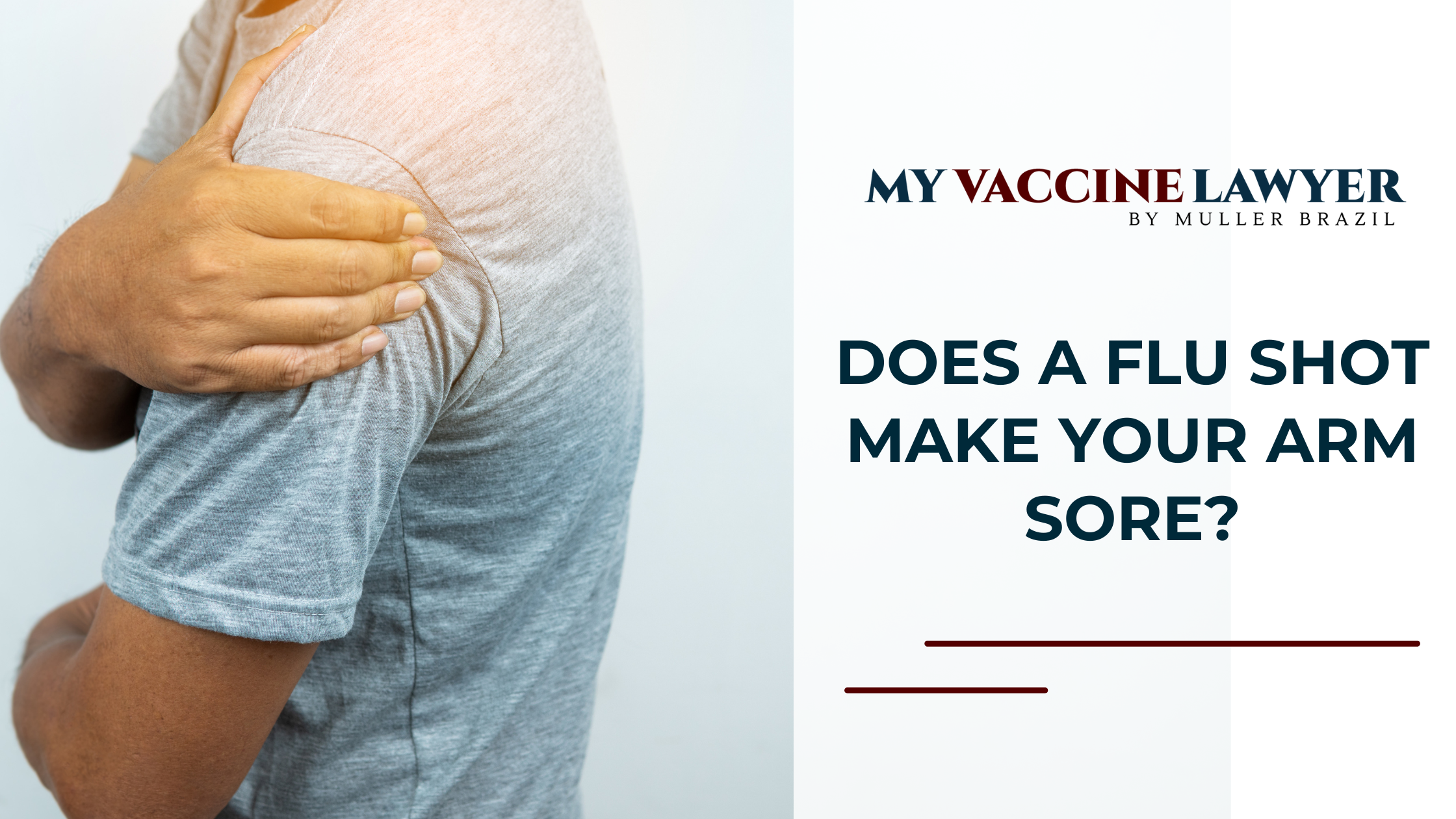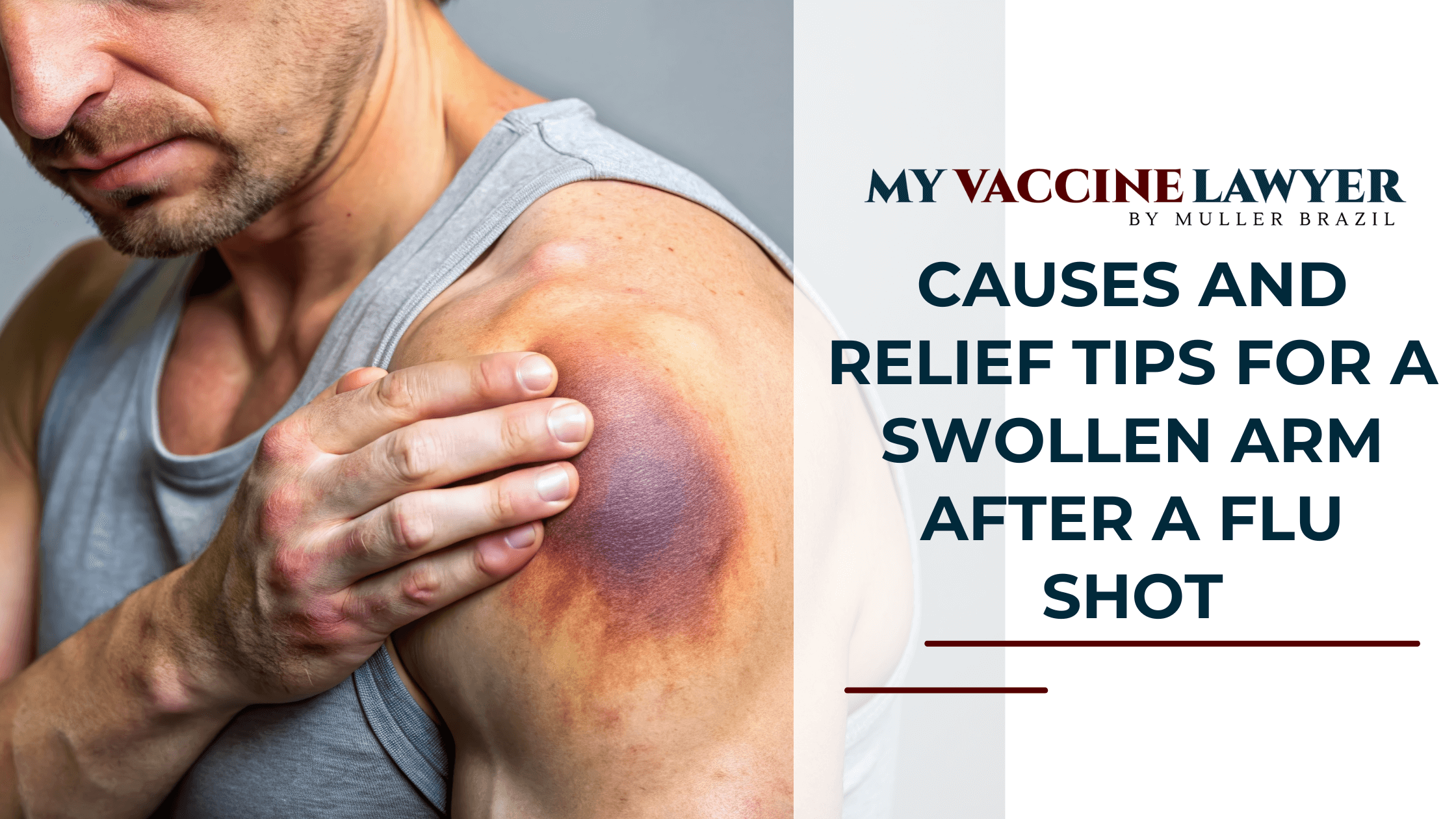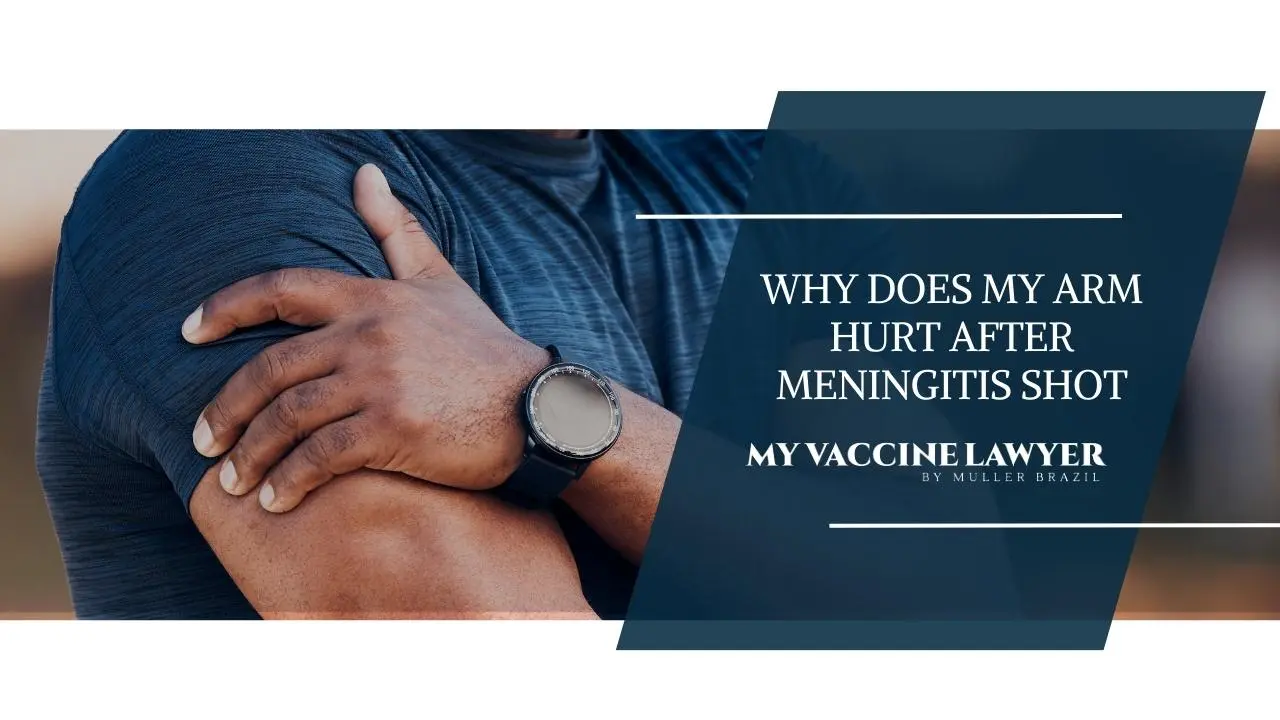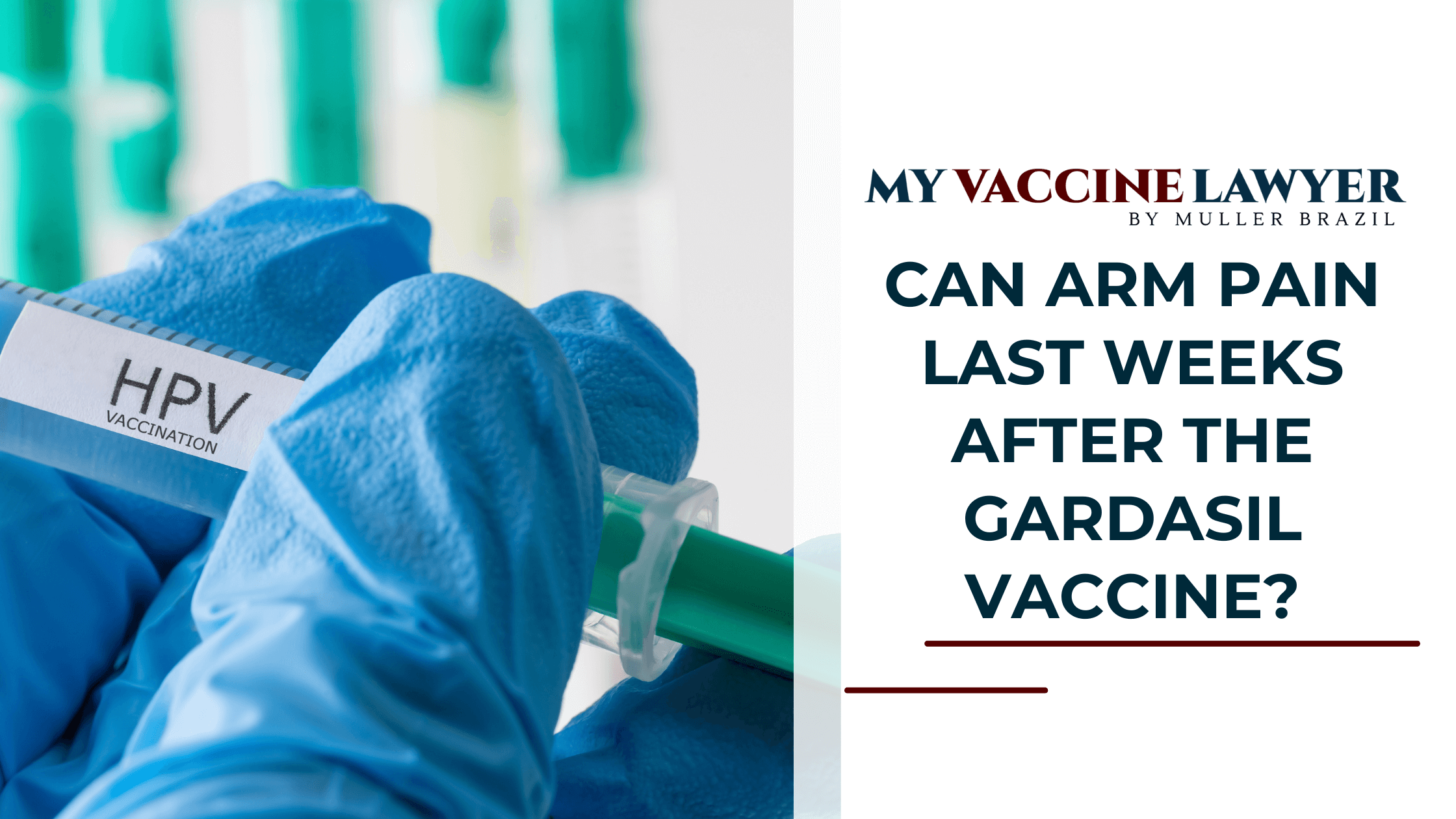Does a Flu Shot Make Your Arm Sore?
A flu shot can make your arm sore due to muscle irritation and your immune response, but persistent pain could signal a more serious issue requiring...
5 min read
Vaccine Injury Law Resources / Arm Pain / Can Arm Pain Last Weeks After the Gardasil Vaccine?
 Max Muller
:
Feb 13, 2025 2:30:00 PM
Max Muller
:
Feb 13, 2025 2:30:00 PM
Arm pain after the Gardasil shot is usually mild and short-lived, but if it persists for weeks, it could be a sign of SIRVA or another vaccine-related injury.
If you received the Gardasil HPV vaccine and are still experiencing arm pain weeks later, you’re not alone. While injection site reactions like mild pain, redness, and swelling are expected after a vaccination, lingering discomfort could signal a more serious issue.
Gardasil is an FDA-approved vaccine designed to protect against the human papilloma virus (HPV), a common sexually transmitted infection linked to cervical cancer and genital warts. It is typically administered in a series of three doses in the upper arm and has been shown to be both safe and effective in clinical trials. However, for some individuals, post-vaccine shoulder pain lasts far longer than expected, potentially indicating a shoulder injury related to vaccine administration (SIRVA).
Here we will discuss why arm pain after an HPV shot can persist for weeks, how to tell if you may have SIRVA symptoms, and what steps to take if you believe you’ve suffered a vaccine-related injury. If you or a loved one has experienced severe shoulder pain or mobility issues after Gardasil, you may be entitled to legal compensation.
Gardasil is an FDA-approved vaccine that protects against the human papilloma virus (HPV), a common sexually transmitted infection linked to cervical cancer and genital warts. The vaccine is typically administered in the upper arm as part of a three-dose series, with the second dose given one to two months after the first and the third dose given four to five months later.
Like other vaccines, Gardasil can cause injection site reactions, which may include:
While these side effects are considered normal, some individuals experience persistent shoulder pain that lasts weeks or even months. This prolonged discomfort could indicate an underlying shoulder injury related to vaccine administration. Improper vaccine administration, such as injecting too high on the shoulder muscles, can lead to inflammation, limited mobility, and chronic pain.
For most patients, arm pain from the HPV vaccine is temporary, but rare cases may require medical attention and treatment. If the pain worsens over time or affects daily movement, it’s important to consider whether SIRVA or another vaccine-related injury is the cause.
There are other adverse reactions that are worth knowing about, particularly for women.
While mild injection site reactions are common after the HPV vaccine, arm pain that lasts weeks or months may be a sign of shoulder injury related to vaccine administration (SIRVA). This condition occurs when a vaccine is administered too high or too deep into the shoulder muscles, leading to inflammation, nerve damage, or restricted mobility.
Unlike normal post-vaccine soreness, SIRVA symptoms often worsen over time and may include:
In some cases, SIRVA can lead to frozen shoulder (adhesive capsulitis), where the shoulder becomes stiff and difficult to move, or long-term nerve or muscle damage requiring physical therapy, steroid shots, or even surgery.
If your shoulder pain has persisted for more than two weeks after receiving the HPV shot, or if you are experiencing severe discomfort, weakness, or mobility issues, it’s important to see a doctor as soon as possible. A healthcare provider may recommend treatments such as anti-inflammatory medications, physical therapy, or imaging tests to diagnose the issue.
For individuals suffering from SIRVA symptoms, seeking early treatment can improve recovery and prevent long-term complications. If your injury has resulted in medical expenses, pain, or loss of function, you may also be eligible for legal compensation.
For most people, arm pain after the HPV vaccine is mild and lasts only a few days to a week. However, when pain persists for weeks or months, it could indicate a more serious issue, such as SIRVA or another vaccine-related injury. The duration of shoulder pain depends on the underlying cause and the effectiveness of treatment.
If arm pain after Gardasil does not improve within two weeks, consider medical evaluation. Depending on the severity of symptoms, treatment options may include:
The sooner SIRVA symptoms are identified and treated, the better the chances of preventing long-term damage. If your shoulder pain has impacted your ability to work or perform daily tasks, you may also have grounds for a legal claim to recover medical expenses and other damages.
Take Control of Your Injury Today
If you have suffered persistent shoulder pain, limited mobility, or other complications after receiving the HPV vaccine, you may be entitled to financial compensation through the National Vaccine Injury Compensation Program (VICP). This federal program was created to provide compensation for individuals who experience serious vaccine-related injuries, including SIRVA and other adverse effects.
The VICP covers medical costs, lost wages, and pain and suffering for individuals injured by vaccines. To qualify, you must:
Unlike traditional lawsuits, VICP claims do not involve suing vaccine manufacturers. Instead, claims are handled through a specialized legal process, and compensation is paid through a government fund.
Filing a VICP claim can be challenging, and having an experienced vaccine injury lawyer significantly increases the chances of receiving fair compensation. A legal professional can help by:
If you believe you have suffered a vaccine-related injury, speaking with a lawyer who specializes in vaccine cases is the best way to understand your rights.
If you are still experiencing shoulder pain weeks or months after receiving the HPV vaccination, it’s important to seek medical attention as soon as possible. While mild injection site reactions typically resolve within days, persistent shoulder pain, weakness, or mobility issues could indicate a more serious injury like SIRVA. A doctor can diagnose the condition and recommend appropriate treatment options such as physical therapy, anti-inflammatory medication, or steroid shots.
In addition to seeking medical care, you may also have legal options. The VICP provides compensation for individuals who suffer vaccine-related injuries, including severe shoulder injuries caused by improper vaccine administration. If your arm pain has impacted your daily life, ability to work, or required medical treatment, filing a VICP claim may help cover medical expenses, lost wages, and pain and suffering.
At My Vaccine Lawyer, our team specializes in helping individuals who have suffered vaccine-related injuries. We understand the nuances of vaccine injury claims and can guide you through the legal process to make sure you receive the compensation you are seeking.
Mr. Muller currently devotes the majority of his law practice to aggressively fighting for the victims of unsafe drug and medical device injuries, as well as vaccine injuries and vaccine reactions involving the flu shot, TDaP/DTaP vaccine, and more. He has handled hundreds of SIRVA injury cases (shoulder injury related to vaccine administration), especially those involving bursitis, tendonitis, frozen shoulder, and rotator cuff tears. Mr. Muller also handles cases where vaccines caused serious nerve injuries such as Guillain-Barre Syndrome. Mr. Muller has recovered millions of dollars in compensation for his clients in the Vaccine Injury Compensation Program.

A flu shot can make your arm sore due to muscle irritation and your immune response, but persistent pain could signal a more serious issue requiring...

Flu shots can cause arm swelling due to your body's immune response, but if the swelling worsens or persists, it may signal a more serious issue...

This is a must-read for anyone experiencing discomfort after receiving a meningitis vaccine. Arm pain, redness, and swelling are common but typically...
